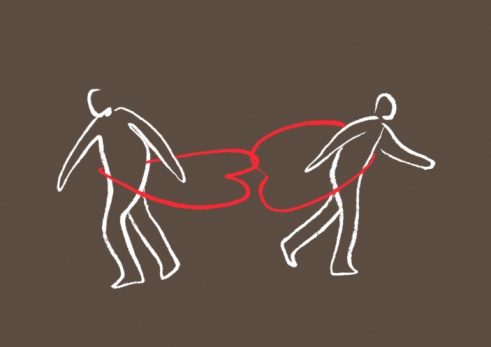 In divorce many people hire attorneys with the hope of receiving what the law entitles them to receive. They focus on their rights and ask their lawyer to help them get what “the law” provides, perhaps believe that this is the best way to protect their interests. Most people don’t realize how focusing on the law and “rights” is setting the bar very low and on occasion, guarantees them that they will need to settle for the very minimum rather than trying to achieve their most important goals.
Divorce laws are created to establish minimum standards for the government to apply if the family cannot come up with a solution on its own. For example, the child support guidelines give you an idea about the minimum amount that would be required for the support of your children if a judge is required to intervene. The property division that your lawyer tells you will be ordered under “the law” merely describes the minimum that the law will compel. The parenting schedule normally describes the minimum times that you must be allowed to see your children. Nevertheless, it is a curious aspect of divorce law that people often start out focusing on those minimums and do not stop to reflect on what might be possible.
Striving for minimums is an unusual way to begin down any path, particularly with something as important as family relationships. Outside of divorce, few of us would ever think that we should provide only the minimum to our family members. We would rarely respond to needs of our children, or our spouse, or a parent or even an aunt or uncle for that matter, and say “what is the very minimum that the law would compel me to do?” To the contrary, faced with these situations outside of divorce, we would be drawn to think in terms of doing the right thing; doing the best we can do under the circumstances. Yet, as soon as we enter the divorce world, we automatically assume this “minimum only” mentality and we hire lawyers to fight over those minimums.
No doubt some you are thinking that divorce is different because you are dealing with an ex spouse and that the rules of conscience and decency should not have the same sway as with a real family member. But is that really how it is?
First of all, if there are children involved, it is difficult to enforce minimums without catching them in the crossfire. Because your children will live in the same house as your former spouse for a significant portion of their lives, there is no way to force your spouse to accept minimums without impacting your children, at least to a degree. In addition, is your spouse, the mother or father of your children, someone who can be immediately relegated to the role of non-relative and allow you to feel a complete indifference to their well-being, (or worse)? No doubt, many divorcing people have found ways to view of their ex spouse in this way. However, most people, once they get past the anger, fear or sadness, admit that they do not hold this complete indifference and, in fact, express real caring, and concern for their ex spouse.
So, how do we shed the “minimums” mentality and approach divorce by setting the bar much higher? It will take more than one blog to cover the many different ways to create better settlements by appealing to higher standards. But here is a start. Go to www.collaborativelaw.org or to www.divorcechoice.com and find a divorce professional who speaks this language. You may be surprised by what is possible.
In divorce many people hire attorneys with the hope of receiving what the law entitles them to receive. They focus on their rights and ask their lawyer to help them get what “the law” provides, perhaps believe that this is the best way to protect their interests. Most people don’t realize how focusing on the law and “rights” is setting the bar very low and on occasion, guarantees them that they will need to settle for the very minimum rather than trying to achieve their most important goals.
Divorce laws are created to establish minimum standards for the government to apply if the family cannot come up with a solution on its own. For example, the child support guidelines give you an idea about the minimum amount that would be required for the support of your children if a judge is required to intervene. The property division that your lawyer tells you will be ordered under “the law” merely describes the minimum that the law will compel. The parenting schedule normally describes the minimum times that you must be allowed to see your children. Nevertheless, it is a curious aspect of divorce law that people often start out focusing on those minimums and do not stop to reflect on what might be possible.
Striving for minimums is an unusual way to begin down any path, particularly with something as important as family relationships. Outside of divorce, few of us would ever think that we should provide only the minimum to our family members. We would rarely respond to needs of our children, or our spouse, or a parent or even an aunt or uncle for that matter, and say “what is the very minimum that the law would compel me to do?” To the contrary, faced with these situations outside of divorce, we would be drawn to think in terms of doing the right thing; doing the best we can do under the circumstances. Yet, as soon as we enter the divorce world, we automatically assume this “minimum only” mentality and we hire lawyers to fight over those minimums.
No doubt some you are thinking that divorce is different because you are dealing with an ex spouse and that the rules of conscience and decency should not have the same sway as with a real family member. But is that really how it is?
First of all, if there are children involved, it is difficult to enforce minimums without catching them in the crossfire. Because your children will live in the same house as your former spouse for a significant portion of their lives, there is no way to force your spouse to accept minimums without impacting your children, at least to a degree. In addition, is your spouse, the mother or father of your children, someone who can be immediately relegated to the role of non-relative and allow you to feel a complete indifference to their well-being, (or worse)? No doubt, many divorcing people have found ways to view of their ex spouse in this way. However, most people, once they get past the anger, fear or sadness, admit that they do not hold this complete indifference and, in fact, express real caring, and concern for their ex spouse.
So, how do we shed the “minimums” mentality and approach divorce by setting the bar much higher? It will take more than one blog to cover the many different ways to create better settlements by appealing to higher standards. But here is a start. Go to www.collaborativelaw.org or to www.divorcechoice.com and find a divorce professional who speaks this language. You may be surprised by what is possible.  In divorce many people hire attorneys with the hope of receiving what the law entitles them to receive. They focus on their rights and ask their lawyer to help them get what “the law” provides, perhaps believe that this is the best way to protect their interests. Most people don’t realize how focusing on the law and “rights” is setting the bar very low and on occasion, guarantees them that they will need to settle for the very minimum rather than trying to achieve their most important goals.
Divorce laws are created to establish minimum standards for the government to apply if the family cannot come up with a solution on its own. For example, the child support guidelines give you an idea about the minimum amount that would be required for the support of your children if a judge is required to intervene. The property division that your lawyer tells you will be ordered under “the law” merely describes the minimum that the law will compel. The parenting schedule normally describes the minimum times that you must be allowed to see your children. Nevertheless, it is a curious aspect of divorce law that people often start out focusing on those minimums and do not stop to reflect on what might be possible.
Striving for minimums is an unusual way to begin down any path, particularly with something as important as family relationships. Outside of divorce, few of us would ever think that we should provide only the minimum to our family members. We would rarely respond to needs of our children, or our spouse, or a parent or even an aunt or uncle for that matter, and say “what is the very minimum that the law would compel me to do?” To the contrary, faced with these situations outside of divorce, we would be drawn to think in terms of doing the right thing; doing the best we can do under the circumstances. Yet, as soon as we enter the divorce world, we automatically assume this “minimum only” mentality and we hire lawyers to fight over those minimums.
No doubt some you are thinking that divorce is different because you are dealing with an ex spouse and that the rules of conscience and decency should not have the same sway as with a real family member. But is that really how it is?
First of all, if there are children involved, it is difficult to enforce minimums without catching them in the crossfire. Because your children will live in the same house as your former spouse for a significant portion of their lives, there is no way to force your spouse to accept minimums without impacting your children, at least to a degree. In addition, is your spouse, the mother or father of your children, someone who can be immediately relegated to the role of non-relative and allow you to feel a complete indifference to their well-being, (or worse)? No doubt, many divorcing people have found ways to view of their ex spouse in this way. However, most people, once they get past the anger, fear or sadness, admit that they do not hold this complete indifference and, in fact, express real caring, and concern for their ex spouse.
So, how do we shed the “minimums” mentality and approach divorce by setting the bar much higher? It will take more than one blog to cover the many different ways to create better settlements by appealing to higher standards. But here is a start. Go to www.collaborativelaw.org or to www.divorcechoice.com and find a divorce professional who speaks this language. You may be surprised by what is possible.
In divorce many people hire attorneys with the hope of receiving what the law entitles them to receive. They focus on their rights and ask their lawyer to help them get what “the law” provides, perhaps believe that this is the best way to protect their interests. Most people don’t realize how focusing on the law and “rights” is setting the bar very low and on occasion, guarantees them that they will need to settle for the very minimum rather than trying to achieve their most important goals.
Divorce laws are created to establish minimum standards for the government to apply if the family cannot come up with a solution on its own. For example, the child support guidelines give you an idea about the minimum amount that would be required for the support of your children if a judge is required to intervene. The property division that your lawyer tells you will be ordered under “the law” merely describes the minimum that the law will compel. The parenting schedule normally describes the minimum times that you must be allowed to see your children. Nevertheless, it is a curious aspect of divorce law that people often start out focusing on those minimums and do not stop to reflect on what might be possible.
Striving for minimums is an unusual way to begin down any path, particularly with something as important as family relationships. Outside of divorce, few of us would ever think that we should provide only the minimum to our family members. We would rarely respond to needs of our children, or our spouse, or a parent or even an aunt or uncle for that matter, and say “what is the very minimum that the law would compel me to do?” To the contrary, faced with these situations outside of divorce, we would be drawn to think in terms of doing the right thing; doing the best we can do under the circumstances. Yet, as soon as we enter the divorce world, we automatically assume this “minimum only” mentality and we hire lawyers to fight over those minimums.
No doubt some you are thinking that divorce is different because you are dealing with an ex spouse and that the rules of conscience and decency should not have the same sway as with a real family member. But is that really how it is?
First of all, if there are children involved, it is difficult to enforce minimums without catching them in the crossfire. Because your children will live in the same house as your former spouse for a significant portion of their lives, there is no way to force your spouse to accept minimums without impacting your children, at least to a degree. In addition, is your spouse, the mother or father of your children, someone who can be immediately relegated to the role of non-relative and allow you to feel a complete indifference to their well-being, (or worse)? No doubt, many divorcing people have found ways to view of their ex spouse in this way. However, most people, once they get past the anger, fear or sadness, admit that they do not hold this complete indifference and, in fact, express real caring, and concern for their ex spouse.
So, how do we shed the “minimums” mentality and approach divorce by setting the bar much higher? It will take more than one blog to cover the many different ways to create better settlements by appealing to higher standards. But here is a start. Go to www.collaborativelaw.org or to www.divorcechoice.com and find a divorce professional who speaks this language. You may be surprised by what is possible. 


 Collaborative Divorce was started in Minnesota 25 years ago and has spread to more than 20 countries because it meets two basic needs felt by divorcing couples around the world. What does it mean to say that a divorce is Collaborative?
First, it is important to understand that difference between the formal Collaborative divorce process (with a capital C) and the use of the word collaborative. To be collaborative simply means to work together and, in that sense, any divorce in which people work together could be described as collaborative, (small c). However, the Collaborative divorce process is something distinctly different.
Most people want to keep their divorce amicable, and Collaborative Divorce gives them the tools to work out of court to make that happen. At the same, people facing divorce want to know that they are protected; that they have someone looking out for their interests. Collaborative Divorce provides each party with an attorney who will work with them to help them achieve their most meaningful goals.
In a Collaborative Divorce, the attorneys must withdraw if the matter goes to court in an adversarial proceedings. That is the one rule. A rule that is simple and yet, changes the entire tenor of the divorce negotiation. It is a great example of addition by subtracting. By subtracting one element, (the ability of the lawyers to fight), a door is opened to add many more valuable tools (true interest based-bargaining, teaming with financial experts and mental health professionals, deeper solutions, etc.). That one change redefines the negotiation and creates a ripple effect that, if handled in a skillful manner, creates many more options.
People sometimes hire aggressive lawyers, reluctantly; believing that their spouse will be aggressive and that they, therefore, need to “fight fire with fire”. The problem, of course, is that fighting fire with fire means there is a great risk that someone (maybe everyone) will get burned.
Collaborative Divorce, with the agreement not to fight, is intended to put out the fire, so that you, and your spouse, can build their future on solid ground. That is not easy to achieve. It requires skill and commitment. An attorney who cannot use argument and fighting must have other skills. Equally important, clients who intend to achieve their highest goals without fighting must be prepared to work on developing other skills as well.
To learn more about the Collaborative Process and to find experts with skill and experience in this area, go to
Collaborative Divorce was started in Minnesota 25 years ago and has spread to more than 20 countries because it meets two basic needs felt by divorcing couples around the world. What does it mean to say that a divorce is Collaborative?
First, it is important to understand that difference between the formal Collaborative divorce process (with a capital C) and the use of the word collaborative. To be collaborative simply means to work together and, in that sense, any divorce in which people work together could be described as collaborative, (small c). However, the Collaborative divorce process is something distinctly different.
Most people want to keep their divorce amicable, and Collaborative Divorce gives them the tools to work out of court to make that happen. At the same, people facing divorce want to know that they are protected; that they have someone looking out for their interests. Collaborative Divorce provides each party with an attorney who will work with them to help them achieve their most meaningful goals.
In a Collaborative Divorce, the attorneys must withdraw if the matter goes to court in an adversarial proceedings. That is the one rule. A rule that is simple and yet, changes the entire tenor of the divorce negotiation. It is a great example of addition by subtracting. By subtracting one element, (the ability of the lawyers to fight), a door is opened to add many more valuable tools (true interest based-bargaining, teaming with financial experts and mental health professionals, deeper solutions, etc.). That one change redefines the negotiation and creates a ripple effect that, if handled in a skillful manner, creates many more options.
People sometimes hire aggressive lawyers, reluctantly; believing that their spouse will be aggressive and that they, therefore, need to “fight fire with fire”. The problem, of course, is that fighting fire with fire means there is a great risk that someone (maybe everyone) will get burned.
Collaborative Divorce, with the agreement not to fight, is intended to put out the fire, so that you, and your spouse, can build their future on solid ground. That is not easy to achieve. It requires skill and commitment. An attorney who cannot use argument and fighting must have other skills. Equally important, clients who intend to achieve their highest goals without fighting must be prepared to work on developing other skills as well.
To learn more about the Collaborative Process and to find experts with skill and experience in this area, go to  Almost all divorces end up in a negotiated settlement. (In most states, less than 5% of all divorces actually go to trial.) Therefore, the most important thing for couples to consider, before they start down the path toward divorce, is how to negotiate the best possible resolution to your divorce.
When I ask most clients what they want from a divorce process, they almost always talk about two things:
1.) They want a divorce that is amicable.
This makes sense. Most wise people would want an amicable divorce; either for the sake of their children, the protection of their finances, preserving their own mental health, or all three. No sane person would choose to have a messy divorce if they can avoid it.
2.) They want to feel protected.
At the same time, almost everyone wants to feel some sense of protection. They are entering into important agreements that will impact their lives and, perhaps, the lives of the children for many years. They do not want to sign an agreement that they will resent or regret.
These two negotiating goals do not need to conflict with each other.
The biggest mistake that people can make is thinking that these two goals are in conflict with each other. They want an amicable divorce but they think the need to hire an aggressive lawyer to protect their needs. Or, alternatively, they think that all lawyers will be aggressive so they avoid getting legal counsel and end up with a settlement that they regret.
Contrary to common belief, it is possible for divorcing clients to have the “best of both worlds”. This is the very reason that
Almost all divorces end up in a negotiated settlement. (In most states, less than 5% of all divorces actually go to trial.) Therefore, the most important thing for couples to consider, before they start down the path toward divorce, is how to negotiate the best possible resolution to your divorce.
When I ask most clients what they want from a divorce process, they almost always talk about two things:
1.) They want a divorce that is amicable.
This makes sense. Most wise people would want an amicable divorce; either for the sake of their children, the protection of their finances, preserving their own mental health, or all three. No sane person would choose to have a messy divorce if they can avoid it.
2.) They want to feel protected.
At the same time, almost everyone wants to feel some sense of protection. They are entering into important agreements that will impact their lives and, perhaps, the lives of the children for many years. They do not want to sign an agreement that they will resent or regret.
These two negotiating goals do not need to conflict with each other.
The biggest mistake that people can make is thinking that these two goals are in conflict with each other. They want an amicable divorce but they think the need to hire an aggressive lawyer to protect their needs. Or, alternatively, they think that all lawyers will be aggressive so they avoid getting legal counsel and end up with a settlement that they regret.
Contrary to common belief, it is possible for divorcing clients to have the “best of both worlds”. This is the very reason that 




